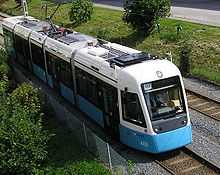Sirio

Sirio (Italian for Sirius) is a low-floor tram built by AnsaldoBreda, an Italian manufacturer of trains, trams and light rail vehicles. It can be ordered as either one-directional or bi-directional and with a variety of track gauges.
Operators
Milan
Azienda Trasporti Milanesi (ATM), the city transport company of Milan, has bought 93 Sirios (all one direction cars). In 2002, the first carriages were delivered. The ATM has 58 seven section Sirios (7100 series) with a length of 35.35 metres (116 ft 0 in); these trams have a capacity of 285 people, of which 71 can sit. The ATM has also 35 five section Sirietto (literally "little Sirio": 7500 series) with a length of 25.15 metres (82 ft 6 in); these trams have a capacity of 191 people, of which 50 can sit. Both types of Sirios have a width of 2.40 metres (7 ft 10 in) and have been built for the unusual track gauge of 1,445 mm (4 ft 8 7⁄8 in). The maximum speed is 70 km/h (43 mph). Part of the 7500 will be numbered in the 7600 series because of minor modifications. It is not exactly known how many Sirio will be built.
All Sirios in Milan sport a dark green livery; the Siriettos sport either the dark green livery or a white-and-yellow livery.
Gothenburg

The City of Gothenburg, Sweden has ordered 40 one-directional Sirio trams which were to be put into service on the Gothenburg tram network during 2005 and onwards. The trams were delivered late and functioned poorly when put into traffic. Among reported problems were excessive track damage caused by the trams, malfunctioning airconditioners inside the trams and poor ride quality. The City of Gothenburg therefore is withholding a large part of the payment for a delivered tram until it is fully operational.[1] On December 3, 2009, the city authorities exercised their option for a further 25 trams of the same design at a cost of €61m.[2] In February 2013, 38 out of the total 40 trams delivered in the first series were taken out of service due to extensive rust on the chassis.[3] Reparing the rusted chassis and moldy passenger floors is expected to be completed by 2017,[4] at a cost for Gothenburg council of an extra 10 million euro according to the revised contract, although Ansaldobreda bears the majority of the cost for these deficiencies.
Other cities
- Athens, Greece: Athens Tram S.A. operates a fleet of 35 bi-directional Sirio vehicles, styled by Pininfarina.
- Florence, Italy: 17 bi-directional.
- Naples, Italy: 22 bi-directional (driver seats in both ends).
- Samsun, Turkey: 16 trams
- Sassari, Italy: 4 st bi-directional for Metrosassari. 950mm track gauge.
- Zhuhai, China: Zhuhai Tram Line 1, opening November 2014.
See also
Notes
- ↑ http://www.nyteknik.se/nyheter/fordon_motor/jarnvag/article44291.ece
- ↑ http://www.railwaygazette.com/news/single-view/view//goeteborg-exercises-tram-option.html
- ↑ http://www.gp.se/nyheter/goteborg/1.1301846-40-vagnar-tas-ur-trafik-pa-grund-av-rost
- ↑ "Rostiga spårvagnar tar tre år att laga". Göteborgsposten. 3 September 2014. Retrieved 3 September 2014.